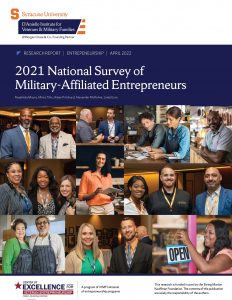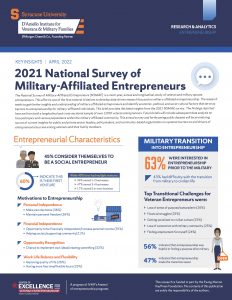The National Survey of Military-Affiliated Entrepreneurs is a multi-year, annual and longitudinal, study of veteran and military spouse entrepreneurs. This effort is one of the first national initiatives to develop data-driven research focused on military-affiliated entrepreneurship. The research seeks to gain better insights and understanding of military-affiliated entrepreneurs and identify economic, political, and socio-cultural factors that serve as barriers to entrepreneurship for military-affiliated individuals. This brief provides the latest insights from the 2021 NSMAE survey. The findings reported here are from both a longitudinal and cross-sectional sample of over 2,000 veteran entrepreneurs. Future briefs will include subsequent data analysis on focused topics and various populations within the military-affiliated community. This annual survey and forthcoming public dataset will be an enduring source of current insights for public and private sector leaders, policymakers, and community-based organization on systemic barriers to and drivers of entrepreneurial success among veterans and their family members.
Entrepreneurial Characteristics
Motivations
Opportunity Recognition
Chance to implement own ideas/creating something
32%
Personal Independence
Make own decisions
36%
Maintain Personal Freedom
36%
Work Life Balance and Flexibility
Improving quality of life
26%
Having more free time/flexible hours
25%
Financial Independence
Opportunity to be independent/increase personal income
35%
Helping society/supporting community
21%
- 36% owned 1-2 businesses
- 47% owned 3-4 businesses
- 17% owned 5 or more business
Military Transition into Entrepreneurship
Top Transitional Challenges for Veteran Entrepreneurs were:
Loss of sense of purpose/camaraderie
26%
Financial struggles
25%
Getting socialized to civilian culture
25%
Loss of connection with military community
25%
Finding employment for myself
24%
Business Characteristics, Growth, and Sales
The Nature of Business
In 2020, their businesses/ventures were:
- Profitable (52%)
- Breaking even (14%)
- Reporting a financial loss (34%)
Businesses/ventures were in
- Service-based business (57%)
- Both product and service-based business (31%)
- Product-based business (12%)
85% consider themselves successful entrepreneurs.
YET
56% depends on their top five customers, and in case they lost those top five customers they would either get out of business or would reap significant negative consequences.
Business Certifications
64% are certified by Center for Verification and Evaluation, through the VA/Vets First (CVE).
61% are certified by Small Business Administration (SBA).
Top Business Designations:
Service-Disabled Veteran-Owned Businesses
71%
Veteran-Owned Businesses
65%
Small Business Certification
35%
Barriers to Entrepreneurship
Disability-Related Experiences
Barriers to Entrepreneurship
The prevalence of certain problems and barriers faced by these veteran entrepreneurs changed dramatically between 2020 and 2021; when comparing the percentage of veteran entrepreneurs in our longitudinal study the biggest changes occurred:
| 2020 | 2021 | ||
| Problems finding good employees | 29.9% | 39.0% | 9.10% Increase |
| Dealing with federal regulations & policies | 16.5% | 27.8% | 11.30% Increase |
| Lack of financing | 37.5% | 24.1% | 13.40% Decrease |
Business Capital
Start Up
96% required initial start-up capital for their business venture.
Growth
92% needed funding to expand or grow a business in 2020.
Sources of Capital
80% of our respondents required financing in 2020.
Startups (0-3 years old businesses)
Personal and family savings of the owner
71%
Personal credit cards
34%
CARES Act's Payroll Protection Program (PPP)
16%
CARES Act's Economic Injury Disaster Loans (EIDL)
15%
Businesses Older Than 3 Years
CARES Act's Payroll Protection Program (PPP)
47%
Personal and family savings of the owner
42%
Business credit cards
33%
CARES Act's Economic Injury Disaster Loans (EIDL
28%
54% applied for credit/financing with a lender or creditor.
Of that 54%…
- 61% did not reapply anywhere
- 28% were turned down by the same or different institution
Debt Overview
The average business debt of the respondents in 2020 was $191,686.
66% report business debt on credit cards.
66% report business debt on credit cards.
How much stress does your business’ financial condition cause you?
No stress at all
18%
Not very much stress
20%
Some stress
40%
A great deal of stress
22%
Entrepreneurial Ecosystem
Finance
Government Support and Programs
Community and Networks
Wellness
79% reported good to excellent general health while 21% reported poor or fair health.
Reported loss of energy either often or constantly during the past week
17%
Reported feeling burnout either often or constantly during the past week
17%
Reported difficulty concentrating either often or constantly during the past week
19%
During past year 4% considered attempting suicide.
Of that 4%…
Covid-19
were able to successfully adapt their business during the pandemic
87%
were able to accommodate remote work
79%
lost business
64%
identified additional opportunities for their business during the pandemic
56%


